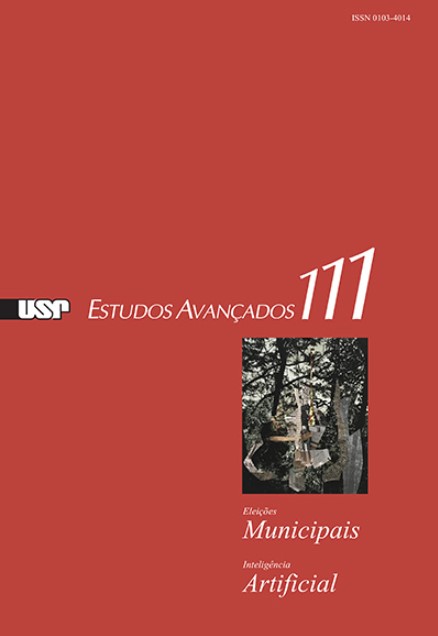Tomada de decisão nas organizações: o que muda com a Inteligência Artificial?
DOI:
https://doi.org/10.1590/s0103-4014.202438111.017Keywords:
Artificial intelligence, Future of work, Organizational decisionsAbstract
Many industries and departments inside organizations have been using Artificial Intelligence (AI) to support managers in making strategic, tactic, and operational decisions. This article summarizes research based on secondary data, analyzing 128 cases of AI usage. It seeks to understand how AI has been contributing to organizational decision-making. It was possible to identify more representativeness of AI adoption in Operations and Marketing areas, mainly in operational decisions and as support for decision making that still includes human beings as part of the decision process.
Downloads
References
ACEMOGLU, D. et al. AI and jobs: evidence from online vacancies. National Bureau of Economic Research, Cambridge, 2020. Ahead of print. DOI: 10.3386/w28257. Disponível em: <http://www.nber.org/papers/w28257.pdf>. Acesso em: 21 jun. 2021.
ALEXANDER, A.; KUMAR, M.; WALKER, H. A decision theory perspective on complexity in performance measurement and management. International Journal of Operations & Production Management, v.38, n.11, p.2214-44, feb. 2018.
ALYOUBI, B. A. Decision support system and knowledge-based strategic management. Procedia Computer Science, v.65, p.278-84, 2015.
AMIT, R.; ZOTT, C. Value creation in e-business. Strategic Management Journal, Chicago, v.22, n.6-7, p.493-520, june / july 2001.
BAZERMAN, M. Processo decisório. 8.ed. Rio de Janeiro: Elsevier, 2014.
BORDOLOI, S.; FITZSIMMONS, J.; FITZSIMMONS, M. Service management: operations, strategy, information technology. 9. ed. New York: McGraw-Hill Education, 2018.
BRANDON-JONES, A.; SLACK, N. Operations management. 9.ed. Harlow: Pearson Education Limited, 2019.
BREALEY, R.; ALLEN, F.; STEWART, M. Principles of corporate finance. 13.ed. New York: McGraw Hill, 2020.
CHUI, M. et al. Notes from the AI frontier: applications and value of deep learning. In: Anais, 2018. Disponível em:<https://www.mckinsey.com/featured-insights/artificial-intelligence/notes-from-the-ai-frontier-applications-and-value-of-deep-learning>. Acesso em: 5 dez. 2021.
DAVENPORT, T.; MALONE, K. Deployment as a critical business data science discipline. Harvard Data Science Review, feb. 2021.
EISENHARDT, K. M.; ZBARACKI, M. J. Strategic decision making. Strategic Management Journal, p.17-37, Winter 1992.
FRANK, M. et al. Toward understanding the impact of artificial intelligence on labor. Proceedings of the National Academy of Sciences of the United States of America, v.116, n.14, p.6531-9, mar. 2019.
GIL, A. C. Métodos e técnicas de pesquisa social. 6. ed. São Paulo: Atlas, 2008.
GERBERT, P. et al. The building blocks of artificial intelligence. In: BCG Henderson Institute, 2017. Disponível em:<https://www.bcg.com/publications/2017/technology-digital-strategy-building-blocks-artificial-intelligence>. Acesso em: 30 abr. 2020.
HAMMOND, J. S.; KEENEY, R. L.; RAIFFA, H. Decisões inteligentes. Rio de Janeiro: Alta Books, 2017.
HODGKINSON, G. P.; STARBUCK, W. H. (Org.) The Oxford handbook of organizational decision making. Oxford: Oxford Handbooks, 2008.
IBM; MORNING CONSULT. Global AI adoption index 2021. IBM Corporation, Armonk, 2021. Disponível em: https://newsroom.ibm.com/IBMs-Global-AI-Adoption-Index-2021.
JARRAHI, M. H. Artificial intelligence and the future of work: human-AI symbiosis in organizational decision making. Business Horizons, v.61, n.4, p.577-586, 2018.
KPMG. Maturidade do compliance no Brasil. 3.ed. São Paulo: KPMG, 2018.
LEE, K. F. AI super-powers: China, Silicon Valey, and the new world order. Boston: Houghton Mifflin Harcourt Company, 2018.
MARR, B.; WARD, M. Artificial intelligence in practice: how 50 successful companies used AI and machine learning to solve problems. Hoboken: John Wiley & Sons, 2019.
MCKINSEY GLOBAL INSTITUTE. The future of work after COVID-19. 2021.
Disponível em: <https://www.mckinsey.com/featured-insights/future-of-work/the--future-of-work-after-covid-19>. Acesso em: 3 dez. 2021.
MCMANUS, J.; WINROTH, M.; ANGELIS, J. Service operations management: a strategic perspective. London: Springer, 2019.
MURO, M.; MAXIM, R.; WHITON, J. Automation and artificial intelligence: how machines are affecting people and places. 2019. Disponível em: <https://www.brookings.edu/research/automation-and-artificial-intelligence-how-machines-affect-people-and-
-places/>. Acesso em: 9 jun. 2021.
PARKER, D. W. Service operations management. 2. ed. Cheltenham: Edward Elgar Pub, 2018.
PORTER, M. E. Competitive advantage: creating and sustaining superior performance with a new introduction. New York: Simon and Schuster, 2008.
RANSBOTHAM, S. et al. Winning with AI: pioneers combine strategy. Organizational Behavior and Technology, 2019. Disponível em: <https://sloanreview.mit.edu/projects/winning-with-ai/>.
RAHWAN, I. et al. Machine behaviour. Nature, v.568, n.7753, p.477-86, Apr. 2019.
RUSSELL, S.; NORVIG, P. Artificial intelligence: a modern approach. 4.ed. Pearson, 2020.
SAMPIERI, R. H.; LUCIO, P. B.; COLLADO, C. F. Metodologia de pesquisa. 3.ed. São Paulo: McGraw-Hill, 2006.
SHIVAKUMAR, R. How to tell which decisions are strategic. California Management Review, Berkeley, v.56, n.3, p.78-97, Spring 2014.
SHRESTHA, Y. R.; BEN-MENAHEM, S. M.; VON KROGH, G. Organizational decision-making structures in the age of artificial intelligence. California Management Review, v.61, n.4, p.66-83, 2019.
SICHMAN, J. S. Inteligência artificial e sociedade: avanços e riscos. Estudos Avançados, São Paulo, v.35, p.37-50, jan. / abr. 2021.
SPETZLER, C.; WINTER, H.; MEYER, J. Decision quality: value creation from better business decisions. Hoboken: Wiley, 2016.
STAKE, R. E. Multiple case study analysis. New York, London: Guilford, 2006.
STONE, M. et al. Artificial intelligence in strategic marketing decision-making: a research agenda. The Bottom Line, [s. l.], v.33, n.2, p.183-200, 2020.
TOEWS, R. Artificial intelligence and the end of work. 2021. Disponível em: <https://www.forbes.com/sites/robtoews/2021/02/15/artificial-intelligence-and-the-end--of-work/>. Acesso em: 7 jun. 2021.
WALCH, K. The seven patterns of AI. 2019. Disponível em: <https://www.forbes.com/sites/cognitiveworld/2019/09/17/the-seven-patterns-of-ai/>. Acesso em: 28 jul. 2020.
WORLD ECONOMIC FORUM. The future of jobs report 2020. Switzerland: World Economic Forum, 2020. Disponível em:<https://www.weforum.org/reports/the--future-of-jobs-report-2020/>. Acesso em: 30 nov. 2021.
ZHANG, D. et al. The AI index 2021 annual report. Stanford: Stanford University, 2021.
Downloads
Published
Issue
Section
License
Copyright (c) 2024 Abraham Sin Oih Yu, André Nardy, Heloiza Izumi Hirano, Jefferson Freitas Amancio de Oliveira, Nathan de Vasconcelos Ribeiro, Nei Grando

This work is licensed under a Creative Commons Attribution-NonCommercial 4.0 International License.
Estudos Avançados não celebra contrato de cessão de direitos autorais com seus colaboradores, razão pela qual não detém os direitos autorais dos artigos publicados. Os interessados em reproduzir artigos publicados na revista devem necessariamente obter o consentimento do autor e atribuir devidamente os créditos ao periódico.


